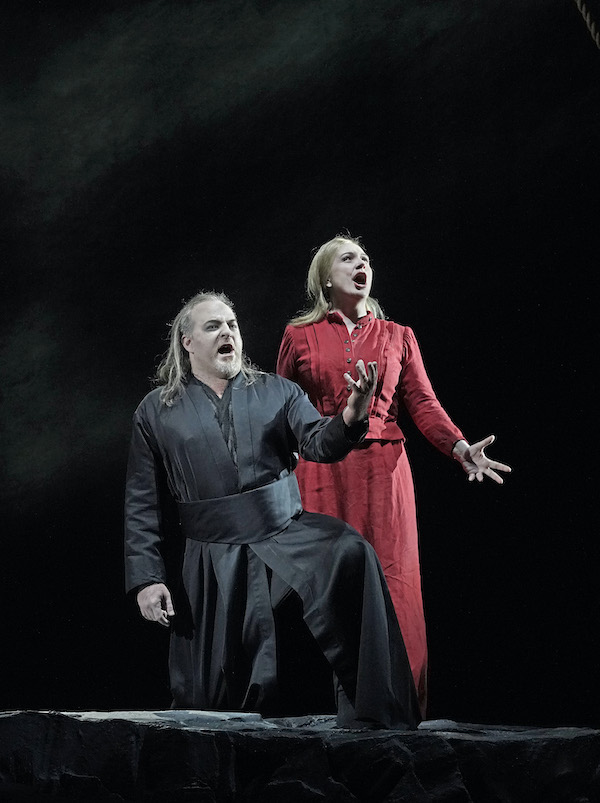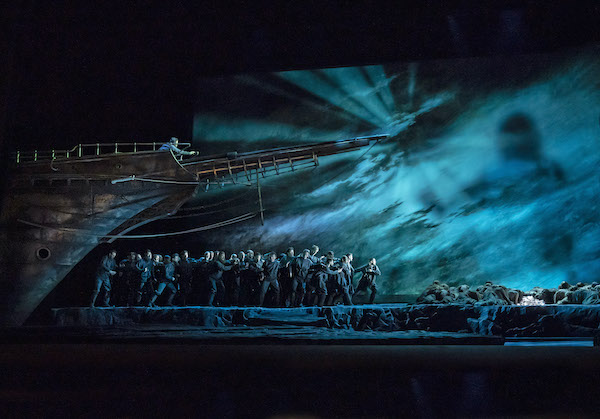Vivid vocalism keeps Met’s muddled “Dutchman” afloat

There is certainly no shortage of memorable overtures in the operatic literature, yet few are so thrilling and vivid as that to Wagner’s Der fliegende Holländer. From the first, icy blast of strings and winds, and the forceful horn call that pierces through the wall of sound, the opening bars thrust the listener into the scene, portraying the terrible power of the sea along with the thrill of racing across the waves.
That opening statement is almost overwhelming, and Wagner struggles to match its lucid power in the rest of The Flying Dutchman. There are certainly ingenious musical elements and gorgeous melodies throughout the piece, yet he has trouble wrangling the story into a coherent libretto, and the focus of the opera suffers as a result.
Much the same could be said of the new production by François Girard that opened at the Metropolitan Opera on Monday night. This dark staging gets close to capturing the atmosphere of the piece, but too many missteps shatter the illusion. Girard offers flashes of brilliance in a sea of confusion, and it was mostly thanks to the cast that Monday’s premiere proved as satisfying as it did.
The Girard production, which first appeared at the Opéra de Québec last summer, tries to get at the eerie heart of this ghost story through its most complicated element: psychology. Girard wisely zeroes in on Senta’s obsession with a portrait of the Dutchman as a key to her character. An enormous painting by set designer John Macfarlane of a searching eye appears on the curtain and then dominates the rear or the stage for all of Act II, inviting the audience to participate in a fixation that approaches madness.
But even when Girard finds the right points of focus, the execution suffers. As the curtain rises, we see a dancer-double of Senta (Alison Clancy) communing with the painting in a sinewy dance, as ghostly waves and the spectral outline of a ship are projected onto the scrim in front. Alone in her red dress, the only flash of color in the staging, she makes for a powerful image; but as her writhing dance goes on the entire length of the overture, it begins to seem aimless, while the projections start to resemble procedurally generated “visualizations.”

It’s odd that Girard, who gave the Met its spare, starkly powerful production of Parsifal has so much trouble focusing his lens in this production. Some ideas don’t go far enough: he hits on the striking image of having Senta’s companions, as they sing about spinning yarn, weave massive ropes hanging from the flyspace into bundles that begin to resemble the rigging of a ship. Yet that element is absent from Acts I and III, so the connection is never completed.
Worse, many moments devolve into unintentional camp: Carolyn Choa’s odd group choreography includes arm-flapping gestures for the women in Act II and forces one poor dancer in Act III to spin in place for a good five minutes during the feast.
This run was originally set to debut with Bryn Terfel in the title role, but he had to withdraw after breaking his ankle in January. Stepping in as the cursed sailor, Evgeny Nikitin had a promising start, showing a lean but muscular sound and powerful, dark color in his first aria, “Die Frist ist um.” But as the night wore on, his voice grew pale and nasal, and lost much of its power. Nikitin’s portrayal overall was wooden, and his singing felt oddly divorced from the text, though he admittedly was not helped by the stage direction. The enormous shadow of the Dutchman projected across the rear wall was in fact one of the production’s most vivid effects, casting him as a phantom floating among the clouds. But rather than using a spotlight in real time, designer Peter Flaherty works a looming shade into his digital projections–which means that Nikitin’s every smallest gesture had to mimic the pre-recorded blocking.
Monday marked an impressive company debut for Anja Kampe as Senta. Her dark-tinged soprano has a flinty edge, yet she had no trouble softening into a warmer sound while maintaining the consistent purity of her tone. Her haunting rendition of the Ballad in Act II felt especially vivid thanks to the dusky hue of her voice, as well as forceful diction that could compete with the gathering storm in the orchestra. She couldn’t avoid some tightness on the role’s highest notes, but even so there was a bracing clarity in her top range, especially in her dramatic final moments.
As Erik, Senta’s former lover, Sergey Skorokhodov was brilliant, the vocal standout of the evening. The robust, almost baritone-like richness in his lower range gives way to a brilliant ring in his middle that stretches all the way to the top. His tender Act III aria, pleading with Senta to remember their love, showed golden warmth and a softer texture. This is an exemplary Wagner voice, and Skorokhodov wielded it with sensitive passion.
David Portillo made a strong impression as the Helmsman, bringing a light tenor with a yearning brightness, and channeling tender longing in his Act I aria “Mit Gewitter und Sturm,” as he pined for his land-bound beloved. Franz-Josef Selig showed a colorful, wooly bass as Senta’s father, Daland, though Girard’s direction forced him into the bizarre position of carrying around the enormous golden nugget the Dutchman gave him in Act I for the remainder of the opera. In her company debut, Mihoko Fujimura brought a wiry mezzo-soprano to the role of Mary, Senta’s tough-edged nurse.
The Met orchestra and chorus sounded splendid under Valery Gergiev’s baton. Rather uncharacteristically, he was reluctant to have his players dig in on Monday; more roughness would have underscored the drama of the opera’s darkest moments. Even so, this was a well-managed reading that had a thrilling pulse and vivid effects: the gossamer texture in the resolution of the overture was spectacular.
Der fliegende Holländer runs through March 27 at the Metropolitan Opera. Patrick Furrer conducts the performances on March 24 and 27, and Alok Kumar appears as the Helmsman on March 24. The March 14 performance will be broadcast live in HD. metopera.org
Posted Mar 04, 2020 at 5:56 pm by Sarah
Am I the only person who thought this production was dreadful? All that money to watch people wander a barren, dark stage, in various wooden poses, to the sound of a surprisingly perfunctory orchestra? Zero drama. This is a huge waste of money. If they were going to do ‘park and bark,’ they should have saved themselves the cash and done this opera the concert performance and mounted a full production of Damnation of Faust.
The soprano was shrill from start to finish; it was painful watching her heave her shoulders as she attempted high notes. She’s also a terrible actress. The only good singer was the tenor who played the helmsman. Portillo has an exquisite sound that carried easily through the house. Such beautiful ping!. The other tenor was excellent, but by the end you could hear his voice beginning to fade. Most of the singers were running out of steam by the end.
Thank God for the Met chorus. Despite the moronic staging and flapping of arms and hands, they delivered, as always, magnificent sound, meticulously wrought. They bring me joy.
The Met is literally my favorite place to be in this City, and I found myself counting the minutes until the end of this dull, annoying production. Unfortunately the Met will be saddled with it for years, if not decades. What a total waste.
Posted Jul 12, 2020 at 3:32 pm by Jeffrey Mark Shabman
I agree 1000% with Sarah. The worst staging of Dutchman I have
ever seen. Thank God I bought the production with Terfel on DVD
from Zurich, Switzerland available at the Met gift shop.